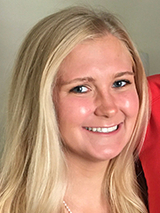Unilateral Hearing Loss and Cochlear Implant: Abby’s Story
Unilateral Hearing Loss and Cochlear Implant: Abby’s Story
Abby’s sophomore year of high school was off to a great start: good grades, swim team, a lot of friends.
Then her friends started telling her, “Get your hearing checked. You’re yelling at us.” She began missing what was going on at school; her grades nosedived. After she failed a mini hearing test at her primary care office, her pediatrician sent her to a local audiologist who, after a full work-up, relayed shocking news: Abby had profound sensorineural loss in her right ear. In teenspeak, she was permanently deaf in one ear.

“I turned to look at my parents and they looked horrified and scared,” Abby says. “It was hard for me to process the news. I was confused, and I didn’t know what it meant for my future.”
Abby had plans: Continue to swim competitively; graduate with a great GPA and get into the college of her choice; earn a dual major in preschool education and creative writing, so she can support herself teaching while she writes novels. With the help of the Cochlear Implant Program at Children’s Hospital of Philadelphia (CHOP), those plans are back on track.
Second opinion — and more
Seeking a second opinion, Abby’s mother, Donna, brought her to the Department of Audiology at CHOP. Their initial appointment grew into a full work-up of various tests, including an MRI scan, as Abby’s diagnosis was confirmed.
Find a Hearing Specialist
We have pediatric audiologists at convenient locations throughout the region.
Find one near you.
That day they met Melissa Ferrello, AuD, CCC-A, who became Abby’s primary audiologist. As the first device option, they tried a CROShearing aid, where sounds that would normally go into her right ear were sent wirelessly to her left (normal) ear. “I didn’t like it at all,” Abby says. Then they tried a regular hearing aid, “but you can’t amplify when there’s no hearing left to amplify,” she says. “It didn’t help.”
That is when the possibility of a cochlear implant (CI) took center stage. A cochlear implant is an electronic device surgically placed under the scalp with an electrode inserted into the inner ear. The CI’s function is to bypass the damaged hearing organ (cochlea) by electrically stimulating the auditory nerve.
More about cochlear implants
Improvement in hearing is not instantaneous; it requires intense work on the part of the recipient to relearn the way they hear to gain maximum benefit.
In early 2019 — the exact time Abby was dealing with her diagnosis — the U.S. Food and Drug Administration had not yet approved the use of one CI for unilateral (one ear) hearing loss. Initially, CHOP’s Cochlear Implant Program team wanted her to complete more testing and additional qualifying steps before determining whether Abby would be a good candidate for a CI. Abby talked to members the CI team, without her parents present, to make her case for implanting the device.
Advocating for herself
“I explained to them what was at stake for me,” she says. “I had to work twice as hard in school and in social situations to follow what was going on. I was experiencing auditory fatigue and was exhausted every day. I understood a cochlear implant was my only option to hear more normally.”
After she had completed the necessary steps, the team recommended her CI. But the insurance company did not approve the surgery. Surgeon Ken Kazahaya, MD, MBA, Medical Director of the program, appealed the decision, highlighting the recent FDA approval for using one CI for treatment of unilateral hearing loss, and Abby’s surgery was approved.
Feb. 12, 2020, was Abby’s outpatient surgery. Her CI was activated on March 10 — right before COVID-19 forced the postponement of all elective procedures.

Her long hair mostly covers the CI, but if it didn’t, she wouldn’t care. “I was aware I might look a little different,” Abby says, “but I wanted to live my best life. That was the priority, and having some hair shaved was so worth it.”
And if people do notice and ask? She’s happy to explain. “I see it as a good opportunity to teach people about cochlear implants and the whole spectrum of deafness,” she says. The kids she teaches swimming to are especially curious — and interested in her story.
‘Better than I could have imagined’
Abby’s audiologist, Ferrello, was instrumental in helping Abby and her family navigate the year-long path to improved hearing. There was getting accommodations at school so Abby could catch up. Abby also worked with Paula Barson, MA, CCC-SLP, speech-language pathologist, who “taught me how to listen through it,” Abby says.
When a CI is first activated, the volume in each electrode is kept low. “Abby and her brain had to bond with the device,” Ferrello says. “Each electrode is responsible for a different frequency. We adjust the CI’s programming at each appointment. Abby did great! She’s a real success story for single-sided deafness and cochlear implantation.”
“Since I knew what it was like to hear normally, the sound coming through the CI was bizarre at first,” Abby says. “Sounds are more electronic, higher pitched, but very clear. It’s not the same as before, but better than I could have imagined.”
Her mother concurs. “She’s back to doing all the things she loves,” Donna says. “She’s fully engaged again in the classroom, still in choir, and still loves music and going to concerts. She goes out with her friends. She’s having a great senior year.”
One of a kind
It’s unusual for a totally healthy teen with no prior hearing problems to spontaneously lose hearing in one ear. None of the testing revealed a cause, a fact Abby has accepted.
“When I first got to CHOP, they told me, ‘You’re going to get through it,’” Abby says. “I’ve come out so much stronger. I think this experience will help me later in life.”